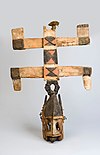
Back ديانة يوروبية Arabic Yoruba dini Azerbaijani Relihiyon kan Yoruba BCL Йорубска митология Bulgarian Relijion yoruba Breton Jorubské náboženství Czech Religion der Yoruba German Θρησκεία Γιορούμπα Greek Religio de la Joruboj Esperanto Religión yoruba Spanish
| Part of a series on |
| Yoruba religion |
|---|
 |
| Deities |
| Beliefs |
| Practices |
| Variants |
|
| Sacred sites |
| Legendary figures |
| Part of a series on |
| Traditional African religions |
|---|
 |
The Yoruba religion (Yoruba: Ìṣẹ̀ṣe), West African Orisa (Òrìṣà), or Isese (Ìṣẹ̀ṣe), comprises the traditional religious and spiritual concepts and practice of the Yoruba people. Its homeland is in present-day Southwestern Nigeria, which comprises the majority of Oyo, Ogun, Osun, Ondo, Ekiti, Kwara and Lagos states, as well as parts of Kogi state and the adjoining parts of Benin and Togo, commonly known as Yorubaland (Yoruba: Ilẹ̀ Káàárọ̀-Oòjíire).
It shares some parallels with the Vodun practised by the neighbouring Fon and Ewe peoples to its west and with the religion of the Edo people to its east. Yoruba religion is the basis for several religions in the New World, notably Santería, Umbanda, Trinidad Orisha, and Candomblé.[1] Yoruba religious beliefs are part of Itàn (history), the total complex of songs, histories, stories, and other cultural concepts which make up the Yoruba society.[1][2][3]
- ^ a b Abimbola, Kola (2005). Yoruba Culture: A Philosophical Account (Paperback ed.). Iroko Academics Publishers. ISBN 1-905388-00-4.
- ^ Cite error: The named reference
YRMwas invoked but never defined (see the help page). - ^ Cite error: The named reference
Religionwas invoked but never defined (see the help page).